
- Shandong Loyal Industrial Co.,Ltd.
- SHORT-CUT PASTA PRODUCTION LINE LONG-CUT PASTA PRODUCTION LINE INSTANT PASTA PRODUCTION LINE
Home> Application> Pinnacle of Efficiency: Unveiling the Potential of Fully Automated Pasta Lines for High Energy Conservation

Pinnacle of Efficiency: Unveiling the Potential of Fully Automated Pasta Lines for High Energy Conservation
Pinnacle of Efficiency: Unveiling the Potential of Fully Automated Pasta Lines for High Energy Conservation
Introduction
In the fast-paced world of food production, pasta stands as a staple, and its evolution has witnessed significant advancements. The traditional methods of pasta manufacturing have given way to a new era with the introduction of fully automated pasta lines. Shandong Loyal Industrial Co., Ltd. has incorporated advanced technologies from FAVA and HEMAKS in the production of its macaroni.This article aims to explore the transformative potential of these advanced systems in achieving high energy conservation. As we delve into the efficiency and precision brought about by automated processes, we will also touch upon the environmental impact of conventional methods and the promising future prospects for the pasta manufacturing industry.
Understanding Fully Automated Pasta Lines
Fully automated pasta lines represent the pinnacle of efficiency in modern food machinery. These systems encompass a sophisticated array of components, integrating cutting-edge technology into every stage of pasta production. With the infusion of robotics, artificial intelligence, and smart sensors, these automated lines redefine the very essence of pasta manufacturing. The role of technology in automating the intricate processes of pasta production not only enhances efficiency but also guarantees a higher level of precision.
Energy Conservation in Pasta Production
The current landscape of traditional pasta production is marred by substantial energy consumption and environmental impact. As we face the challenges posed by climate change, the potential for energy conservation becomes paramount. Fully automated pasta lines emerge as a beacon of hope, promising reduced energy consumption and a more sustainable approach to pasta manufacturing. The shift towards automation aligns with the global call for environmentally conscious practices in the food industry.
Efficiency and Precision in Pasta Making
One of the standout advantages of fully automated pasta lines lies in the enhanced precision achieved during ingredient measurement and mixing. The meticulous calibration of these systems ensures consistency in pasta quality, surpassing what traditional methods can deliver. A comparative analysis between fully automated processes and traditional methods highlights the efficiency gains and the positive impact on the overall pasta-making experience.
Technological Innovations in Fully Automated Systems
The integration of advanced robotics in fully automated pasta lines goes beyond mere mechanization. These robotic systems are equipped with intricate algorithms that enable them to replicate the delicate movements and precision required in pasta production. From kneading and shaping to the intricate details of pasta formation, these robots operate seamlessly, ensuring a consistent and high-quality end product. This synergy of robotics and culinary craftsmanship not only enhances efficiency but also opens the door to new possibilities in pasta design and customization.
Artificial intelligence (AI) plays a pivotal role in optimizing production parameters in fully automated pasta lines. AI algorithms analyze data in real-time, adjusting variables such as temperature, humidity, and ingredient proportions to maintain optimal conditions throughout the manufacturing process. This level of adaptive intelligence ensures that each batch of pasta meets the desired quality standards. The marriage of AI and pasta production elevates the industry to a level of precision and consistency previously unattainable through traditional methods.
In addition to robotics and AI, the incorporation of machine learning algorithms further refines the performance of fully automated pasta lines. These algorithms continuously learn from production data, identifying patterns and making incremental improvements to enhance efficiency and reduce resource wastage. The self-optimizing nature of machine learning contributes to a dynamic and adaptive pasta manufacturing process, where each cycle builds upon the insights gained from the previous one.
Smart sensors in fully automated pasta lines serve as the eyes and ears of the production process. These sensors monitor various parameters, such as temperature, moisture levels, and pasta texture, in real-time. Any deviations from the preset standards trigger immediate adjustments, ensuring that the entire production line operates with precision and accuracy. The responsiveness of smart sensors not only guarantees the quality of the final product but also contributes to energy conservation by preventing unnecessary reprocessing.
Case Studies
Barilla, a global pasta giant, stands out as a prime example of successful adoption and implementation of fully automated pasta lines. The company's commitment to sustainability and efficiency is reflected in the significant energy savings achieved through automation. Barilla's journey showcases the seamless transition to automated processes, with innovative solutions addressing challenges and solidifying their position as an industry leader.
Banza, known for its innovative chickpea-based pasta, has embraced automation with a focus on maintaining product quality. The company's case study illustrates how automated systems contribute not only to energy savings but also to the consistent texture and taste of their unique pasta products. Banza's success underscores the adaptability of fully automated pasta lines across diverse pasta varieties.
Jovial, a brand synonymous with organic and gluten-free options, has leveraged fully automated pasta lines to meet the growing demand for specialized products. The company's case study highlights how automation enables the precise handling of alternative ingredients, ensuring the integrity of their gluten-free pasta. Jovial's experience exemplifies the versatility of automated systems in accommodating diverse production requirements.
DeLallo, a family-owned brand with a rich heritage, has navigated the transition to fully automated pasta lines while preserving traditional craftsmanship. Their case study emphasizes the coexistence of heritage and innovation, showcasing how automation can enhance efficiency without compromising the artisanal quality of their pasta. DeLallo's success story demonstrates the harmonious integration of tradition and technology.
Future Prospects and Industry Trends
The future of pasta production is intricately linked to the ongoing advancements in fully automated systems. As the industry continues to evolve, we anticipate even more sophisticated technologies shaping the landscape. Emerging trends point towards a fusion of AI and robotics, further streamlining pasta manufacturing processes. Predictions for the industry foresee a dynamic shift towards sustainability, driven by the continued integration of innovative technologies.
Conclusion
In conclusion, the unveiling of the potential of fully automated pasta lines marks a watershed moment for the pasta manufacturing industry. The advantages in terms of efficiency, precision, and energy conservation are clear and compelling. Companies such as Barilla, Banza, Jovial, DeLallo, and Faella serve as beacons of success in this transformative journey. As we look ahead, the industry must rally behind sustainable and energy-efficient practices, ensuring a promising and flavorful future for pasta production. The automation of pasta lines is not just a technological marvel but a commitment to a more environmentally conscious culinary world.
Contact Us

- Shandong Loyal Industrial Co.,Ltd.
- Telephone+86 13176674591
- Email[email protected]
- WhatsApp+86 13176674591
- WeChat13176674591
- AddressC623, Jiahui Global Plaza, No. 548, Beiyuan Street, Tianqiao District, Jinan City, Shandong Province
- Factory AddressADD -300m North of Zhangxia Industrial Park, Binhe Road, Zhangxia Town, Changqing District, Jinan
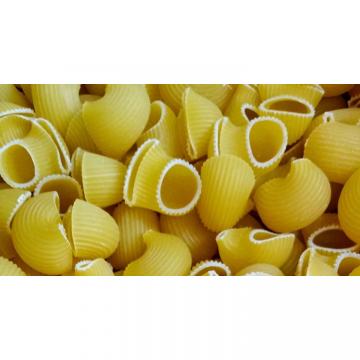

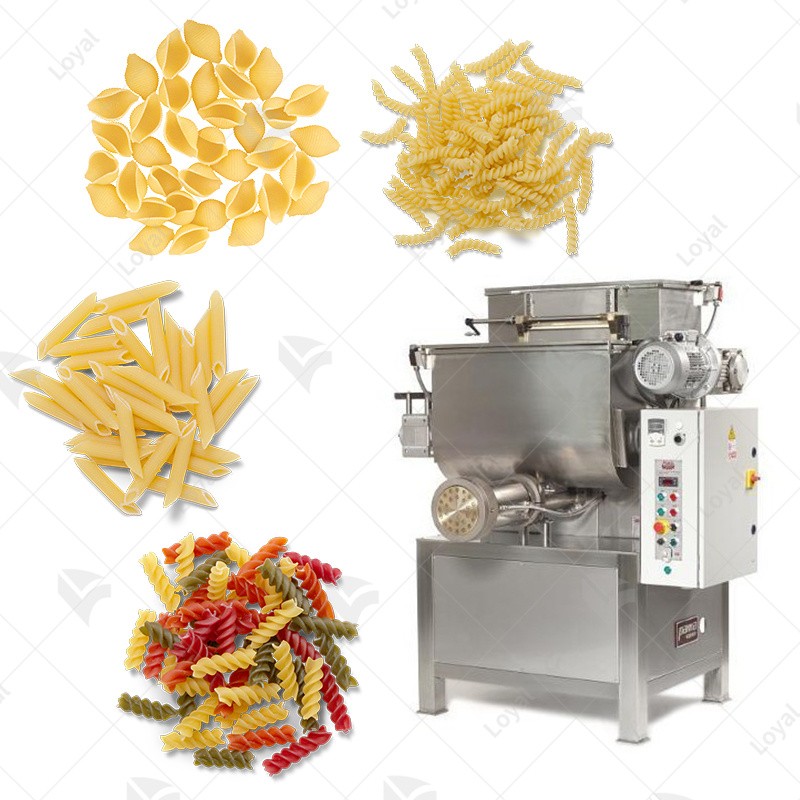

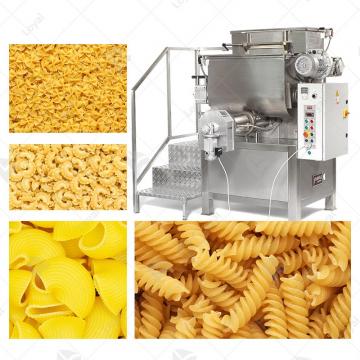
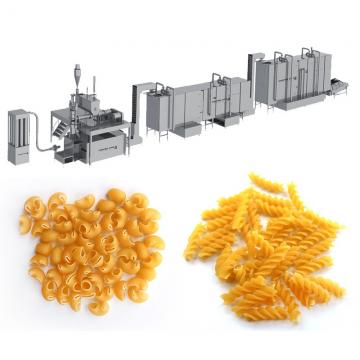 Vacuum Extruder Pasta Machine
Vacuum Extruder Pasta Machine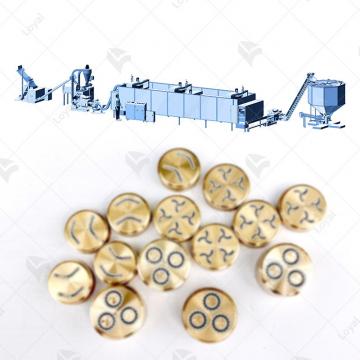 Pasta Processing Equipment
Pasta Processing Equipment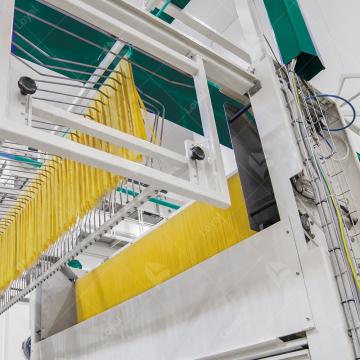 Long-Cut Pasta Production Line
Long-Cut Pasta Production Line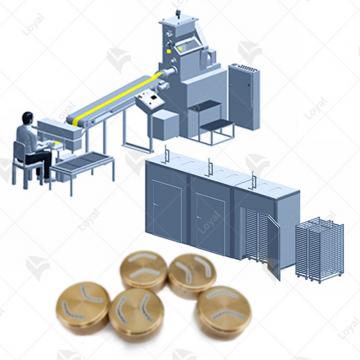 Dry Pasta Production Line
Dry Pasta Production Line